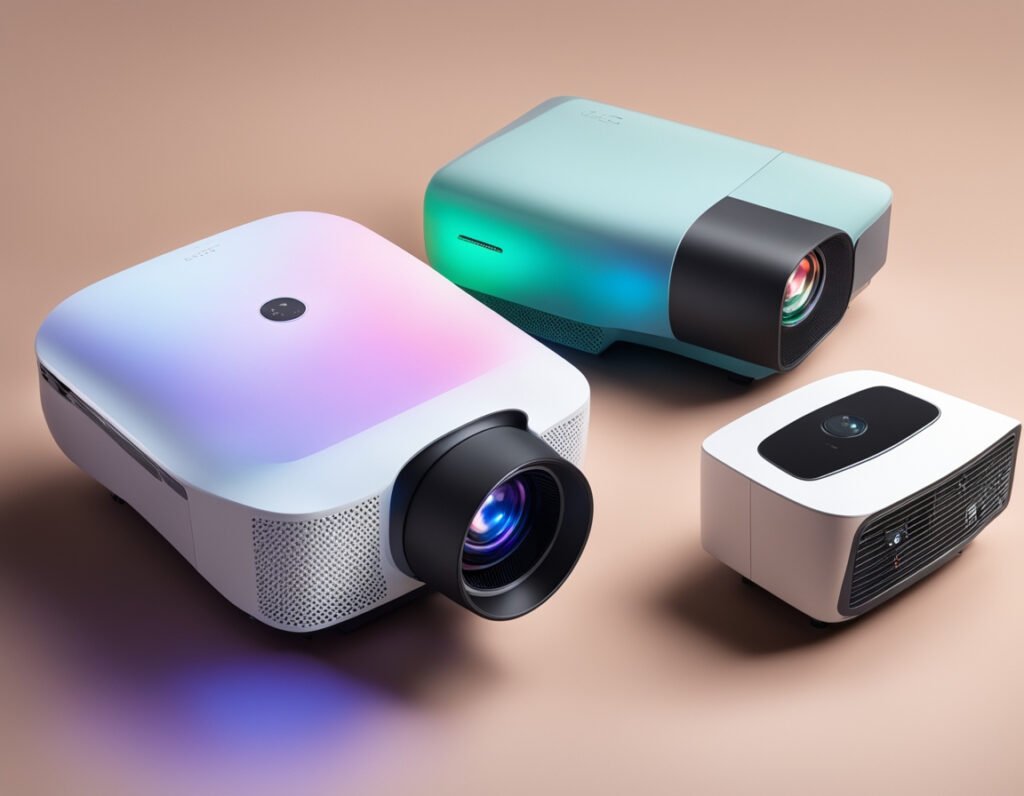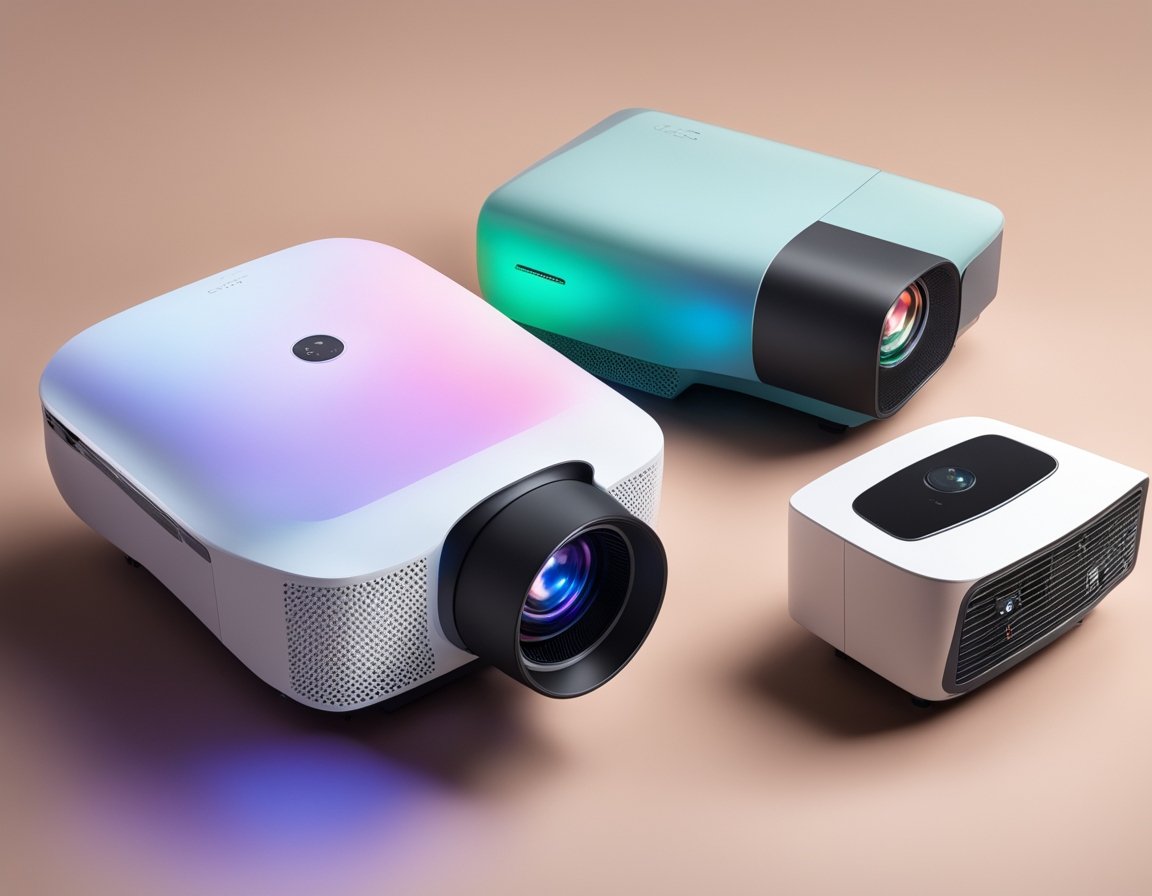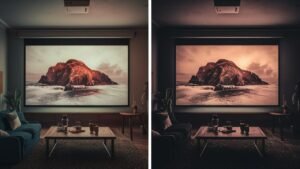
Selecting the ideal projector for your home theater, business presentations, or educational requirements can change everything. When purchasing a projector, it’s important to know what to look for because many alternatives are available. This all-inclusive projector buying guide will go over every detail to help you make an informed choice that meets your unique requirements.
Table of Contents
When purchasing a projector, what should I look for?
Consider your major use case while looking for a projector. Will you be using it for home movie evenings, business presentations, or classroom instruction? Understanding the requirements for each application will help you select the ideal projector.
Key Factors to Consider
Resolution: How Clear Do You Want Your Picture?
Resolution is a critical factor that determines the clarity and detail of the projected image. Here’s a breakdown:
- HD (720p): Suitable for basic presentations and occasional movie watching.
- Full HD (1080p): Ideal for home theaters and high-definition content.
- 4K Ultra HD (2160p): Offers the best picture quality with sharp details, perfect for high-end home theaters and professional uses.
For home theaters and gaming, a 4K projector provides an immersive experience, while a 1080p projector is sufficient for most educational and business purposes.
Brightness: Will You Use It in a Bright or Dark Room?
Brightness, measured in lumens, is essential for visibility, especially in well-lit rooms. Here’s what you need to know:
- Less than 1,500 lumens: Best for dark rooms.
- 1,500 to 3,000 lumens: Suitable for rooms with some ambient light.
- Above 3,000 lumens: Ideal for bright rooms and large venues.
Choose a projector with higher lumens if you plan to use it in a brightly lit room or outdoor settings.

Contrast Ratio: How Vivid Do You Want Your Colors?
The contrast ratio calculates the difference in brightness between an image’s darkest and brightest areas. Deeper blacks and more vivid colors are associated with a higher contrast ratio. For example, presentations work well with a contrast ratio of 1,000:1, but movies and video games benefit more from a 10,000:1 ratio since it provides more color depth. For home theaters to experience rich and vibrant images, a higher contrast ratio is essential.
Aspect Ratio: What Shape Will Your Image Be?
The proportionate link between the image’s width and height is known as the aspect ratio. Aspect ratios like 4:3 (traditional, best suited for presentations and older content), 16:9 (widescreen, best suited for current TV shows and movies), and 2.35:1 (ultra-widescreen, great for cinematic experiences) are common. Select an aspect ratio according to the kind of content you will be watching most of the time.
Throw Distance and Screen Size: How Big Is Your Space?
The distance that separates the projector and the screen is called throw distance. The sharpness and size of the image are impacted. Compact spaces are perfect for short throw projectors, which project huge pictures from a short distance. Large venues are ideally suited for long throw projectors, while medium to large spaces work well with standard throw projectors. To guarantee a crisp and precisely scaled image, measure your area and select a projector with the right throw distance.
Lamp Life: How Often Will You Need to Change the Bulb?
The lamp life of a projector shows how long it will survive before needing to be changed. Standard lights in projectors normally have a life of 2,000–3,000 hours, while extended lamps—which are frequently found in LED or laser projectors—have a life of 5,000–10,000 hours. When selecting a projector, take into account the light life and the price of new bulbs.
Portability and Mounting Options: Will You Move It Around?
Think about your projector’s portability if you need to move it around a lot. Portable projectors are simple to set up and lightweight. Look for table mounts with flexibility and simplicity of use or ceiling mounts with little space consumption and a sleek appearance for fixed installations. Select what suits your needs for setup and usage.

Connectivity Options: What Devices Will You Connect?
Modern projectors come with various connectivity options:
- HDMI: Standard for connecting to computers, Blu-ray players, and gaming consoles.
- VGA: Commonly used for connecting to older computers.
- USB: Allows for easy connection to storage devices.
- Wireless: Enables connections without cables, ideal for flexible setups.
Ensure your projector has the necessary ports to connect all your devices.
Audio Capability: Do You Need Built-In Speakers?
Even though a lot of projectors include built-in speakers, their sound quality might not be the finest. While exterior speakers offer superior sound quality for home theaters and large venues, built-in speakers are more practical for small spaces and portability. Consider your needs while making a decision on audio.
Keystone Correction and Lens Shift: How to Get the Perfect Image?
These functions aid in resizing the picture to precisely suit the screen. While lens shift modifies the image position without moving the projector, keystone correction corrects image distortion caused by an angled projector. These characteristics guarantee an ideal image and are essential for adaptable setups.
Special Features: Are There Any Extra Features You Need?
A wide range of additional features are included with modern projectors, including 3D support for an immersive viewing experience, interactive elements beneficial for educational settings, and smart features like integrated streaming apps and internet access. Based on how you use them, decide if these features are really important.
Brand and Model Reliability: Which Brands Can You Trust?
Selecting a reputable brand guarantees longevity and excellence. Examine product reputation, study reviews, and take into account models from reliable manufacturers such as Optoma, BenQ, Sony, and Epson. Reputable brands frequently provide better warranty services and customer support.

Warranty and Customer Support: How Important Is After-Sales Service?
For peace of mind, you need a solid warranty and reliable customer service. Examine the warranty period, which usually lasts from one toto three years, and analyze the responsiveness and availability of customer service. Prior to making a purchase, review reviews and company policies.
Budget: How Much Are You Willing to Spend?
Reducing your alternatives is facilitated by establishing a reasonable budget. There are high-end models and more reasonably priced projectors available. Basic projectors for sporadic use cost less than $500. Better-featured mid-range projectors fall between $500 and $1,000, and top-tier performance can be found with projectors beyond $1,000. The best projector will be determined by balancing your needs and budget.
Where to Buy a Projector
Local electronics retail outlets sell projectors that are available for immediate purchase and hands-on testing, albeit their selection may be more limited and their pricing may be higher. Although they don’t do in-store testing and may have delivery problems, online shops provide a large assortment at affordable costs. Although they are frequently more expensive and have fewer locations, specialized A/V merchants offer thorough solutions and professional help. Purchasing directly from manufacturers can result in exclusive offers and trustworthy sources, but there may be fewer possibilities and some delays.
Conclusion
Many aspects, including as resolution, brightness, contrast ratio, and connectivity choices, must be taken into account when selecting the ideal projector. You may improve your watching experience by selecting a projector that best suits your needs by being aware of its main characteristics.
FAQs
What Projector Should I Buy?
Consider your primary use case, budget, and the key factors discussed to choose the right projector for your needs.
What Specifications Should I Look for When Buying a Projector?
Key specifications include resolution, brightness, contrast ratio, aspect ratio, and connectivity options.
Where Can I Buy Projectors?
Projectors can be purchased from local electronics stores, online retailers, specialized A/V retailers, and directly from manufacturers.




